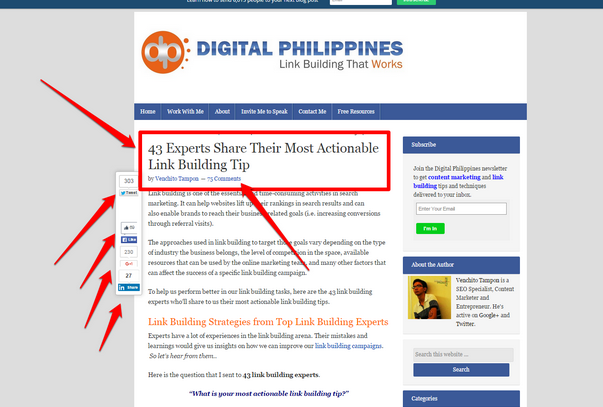

Search engine optimization is famous for being a tricky game, especially since Google’s algorithmic changes tend to get ever more complicated. Paying attention to brand mentions, and capitalizing on them, can be a highly effective strategy for building links and your reputation as a whole.
While we will never know the exact details of Google’s algorithms, all you need to know about your link building strategy is that it should be backed by high-quality content. While the assumptions webmasters make about the Google algorithm changes can’t be called scientific, the major criteria are intuitive.
Understand the Trend
Brand authority is difficult to measure from inside your business.
Yet, there are many fruitful sustainable strategies, based on both content and link building. Basic empathy principles can be applied in off page SEO techniques. If you wouldn’t link towards a site, this means you don’t want the search engines to associate you with it.
Keep in mind:
- Sites that mention you will be reluctant to link to you if your content isn’t high-quality
- You don’t want to be linked to by a low authority site
Track niche keywords in order to understand your position and your competitors’ strategies on the web as a general direction for outlining your good content and increasing your notoriety. Above all, remember: none of the following strategies will be effective if you don’t publish high-quality content.
From Web Mention to Link
There are two distinct steps when trying to convert brand mentions into link building opportunities.
- Start by searching for mentions that are of interest for your current niche (and presumably the ones you wish to further develop).
- Reach out to people using those particular keywords, including your brand name – that makes the difference between a static entity and an organic presence.
Spotting New Web Mentions
Media monitoring gives you insight on the web mentions linked to keywords or topics that interest you or that you cover—this works especially if you are proficient in your niche.
Some free tools you could use for web mentions monitoring are:
- Google Alerts
- Brand Mentions ( I am the founder, but it’s a free tool)
- Talk Walker
Each of theses tool provides different results. You should test them all and decide which one fits you best.
Among the mentions, you’ll find words that link to specific pages, some of which are 404, not available, or poorly updated. The next step is to contact the site admins and suggest a replacement with one of your links, covering the same topic in a better manner. Most of the time this works, because you already know they’re interested in that specific content.
Do the Outreach
Like any other systematic approach, you’ll have to plan an outreach strategy and benchmark your way through it. Make alerts on very specific, niche-oriented topics – this increases your success rate. If you’re experiencing very low responses, here are two of the possible reasons:
- You’re not addressing who you should: Maybe the sites you’re contacting are not interested in your niche, or maybe they’re already set with their collaboration on what you’re suggesting.
- You’re not addressing the way you should: The email copy should speak for itself, you want to sell that idea properly, building trust and not looking spammy.
Back to Content: News AND Evergreen Content—Not a Versus Scenario
Monitoring the trends in your niche helps build sustainable marketing strategies that bring ROI. But you already know that. There are endless debates whether content should be news-based or evergreen. Obviously, there are significant advantages on both directions, when done professionally.
Before deciding what your next article is going to be about, ask yourself what you would write if there were no algorithm – because that is the very answer to your question. Don’t be restrictive on your good quality, interesting content that creates engagement because you’re afraid of technicalities.
Evergreen content is pure gold in long-term link building because its perennity makes it always reachable to key audiences, and the chances to get someone to link to it are higher – basically because you can also ask them in 5 years’ time. But there’s something that you may want to take into account: the posts that bring a new perspective first.
Writing first about something big gets you links from high authority sources and massively increases your chances to boost the PA and DA.
And while planning long-term strategies may look like a painful process, the results are worth it, because most web users only click on organically built links.
Dofollow and Nofollow: A Dilemma You Can Get the Hang Of
When it comes to anchor texts, the question you should ask is what it would you use if there were no penalties or benefits – again, this is just how they’re meant to be done. If you want a link to look branded instead of commercial, sometimes it’s best to use more words on the anchor texts – the same goes when you’re trying to do sustainable link building for your site. Choose what makes sense and what is most helpful to the user, not what you think Google will like.
Because the Google bots can’t crawl like professional people permanently reading all the content online would (yet?!), it looks instead for indicators of your content’s general performance. The anchor texts are an important part of that and, like Matt Cutts pointed out, instead of bothering to make links look natural, keeping them editorial is the best option there is.
While monitoring your brand name, you’ll see that sometimes high authority sources will cite you with nofollow links – and you’ll be outraged and tempted to contact them to change it to a dofollow.
While sometimes this may work, being linked with a nofollow by a very high authority source (say BBC) is ten times more valuable to your long term link building strategy than being linked to by five mediocrely ranking sites.
The math is simple – your chances of being editorially linked to by other good authority sites are exponentially higher and you’re bound to earn more than five mediocre links at the end of the day. So it’s all a matter of time and place.
Find Influencers in Your Niche
Blogging is the cool kid of social media. Everybody wants to do it.
And they should!
Since 2010, blogging has increased companies’ indexed pages with over 400%. You probably already have in mind a good set of professionals whom you appreciate for their dedication and training in your field – contact them.
Ego bait is a white hat strategy to improve your inbound links. Interview influential, popular people in your industry and ask them to tell you about their expertise, and then post it on your blog. This will attract more links than you’d expect – but make sure you’re the kind of professional they’d like to associate their image with.
For instance, a very good example of this technique is given by digitalphilipines.net. In one article, they have managed to summon not one, not two, but 43 experts to give advice on link building strategies, which in itself is a very solid technique.
As you can see from the screenshot, the article has brought engagement, in onpage as well as shareability on all important social media platforms.

Use your alerts and mentions to get in contact with people – for either guest posting, asking to be linked or even long time non-commercial, professional partnerships. Don’t abuse it, and be very careful whom you contact – for instance, a criterion you may want to take into consideration is the site being mobile friendly. During the last few years, this has become extremely relevant, partly because mobile browsing has become massively popular.
Having a mobile friendly website is not a question of preference anymore, but a must for anyone building an online reputation. In fact, I’d expressly advise making it one of the basic criteria for your professional networking.
Remember
Although implied links might be important as far as semantic search goes, traditional links are far from being obsolete.
While I totally support converting mentions into links for anyone out there who’s trying to strengthen their presence online and develop their niche, an organic way of increasing authority is still high-quality content.
Since it is in Google’s best interest to show the most relevant results for our needs — more so than literally what we search for — semantic criteria have been integrated into the algorithm. Traditional link building implied explicit URLs posted either as part of the content or as an embedded hyperlink anchor text. Now that brands have a semantic approach, rather than simply a keyword-centric approach, this makes the overall relevance and authority of the source important to you.
[“source-searchenginejournal”]
